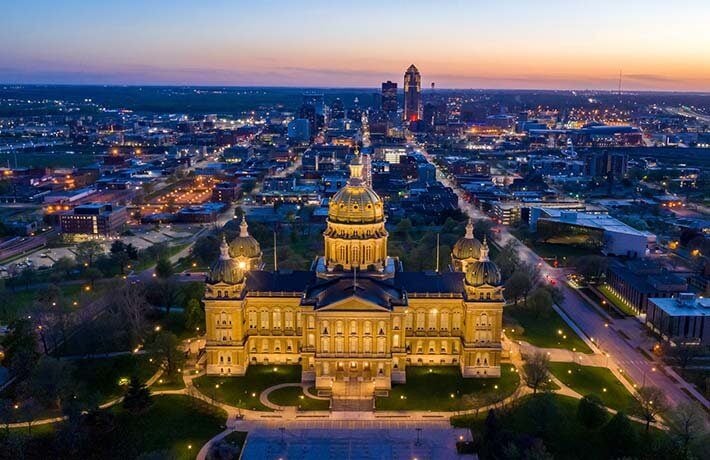03-17-2025 |
2025 Government Relations Legislative Update - Week Nine
By: Matthew H. McKinney, R.G. Schwarm & Julie A. Smith

Capitol Update
Most of this past week consisted of House and Senate floor debate as there is a push to advance bills from one chamber to the other in order to meet the next funnel deadline (April 4th), particularly bills that are not filed in both Chambers. The House passed 52 bills and the Senate passed 30 bills. This week, five of those bills have been sent to the Governor for her consideration.
One of the differences during this period of session relates to amendments. House rules require amendments be filed 24 hours in advance of debate; amendments to amendments, however, are not subject to this rule. In the Senate, amendments may be filed without any advance notice. In fact, in the Senate, debate on a particular bill can be deferred for an amendment to be drafted and filed that same day. Bills that have died already in the funnel can be revived through amendments to other bills. Amendments sponsored by the Floor Manager of the bill are usually accepted.
On Tuesday, Blaine Watkins (R) won a special election in House District 100 to finish out the end of Representative Martin Graber’s term due to Graber’s unexpected passing in January. Watkins graduated from Grand View University in December 2024 completing degrees in political science and government. He is currently State Senator Jeff Reichman’s clerk. Representative-elect Watkins won by approximately 52% of the vote, defeating Democrat Nannette Griffin.
The Senate passed a bill on Monday, SF 295 that authorizes the Department of Administrative Services to dispose of the Wallace Building and adjacent parking garage. The Wallace Building is located at the Northwest Corner across from the Capitol. It is iconic in that it is situated in such a way that the front of the building reflects a picture of the Capitol. Iowa Code section 8A.321 requires authorization of each chamber in the General Assembly and the Governor’s approval prior to disposing of any building on the Capitol Complex. Construction of the Wallace Building was completed in 1978 at a cost of $10.4 million. Over the years, the building has required substantial repair and maintenance. Currently, only the Iowa Department of Agriculture and Land Stewardship and some administrative law judges office in the building.
The Fiscal Note, published by the nonpartisan Legislative Fiscal Agency estimates maintenance costs for the building to be $31 million and renovations costs to be $85 million. The Note sets forth the estimated costs of two options, one to demolish the building and sell the property and the other is to create and sell a standalone building. Upfront costs are paid through federal funding and revenue from the sale is to be deposited in the general fund.
In the Know
A sure sign that the session is moving forward is the meeting of the Revenue Estimating Conference (REC) in March. This is important from a practical perspective because the annual legislative appropriations process cannot move forward until this meeting. The REC meeting was held Thursday and the conclusion was that the legislature will be required to use a $217M lower estimate to prepare the state budget as compared to the December 2024 estimate. Iowa Code Section 8.22A requires the REC to meet at least three times per year with at least one of the meetings taking place in March. The Revenue Estimating Conference (REC) was first established during the 1986 legislative session and its duties have evolved over the years.
The REC has three members - the governor or designee, the director of the Legislative Services Agency or designee, and a third person agreed upon by the other two members. Current members of the REC are the Director of the Department of Revenue, Kraig Paulsen; The Fiscal Division Director for the Legislative Services Agency, Jennifer Action; and Jeff Plagge, Public Member. The members must agree on an estimate for the current fiscal year and for the following fiscal year for the general fund of the state, lottery and gambling revenues, and interest earned from the cash reserve fund and economic emergency fund to be deposited in the rebuild Iowa infrastructure fund. At the March meeting, members must also agree to an estimate of revenues for the fiscal year following the next calendar year. If the March meeting results in a lower estimate, the Governor and legislators are required to use the lower amount for purposes of budgeting for the next fiscal year.
Following the REC meeting, Governor Reynolds issued a Press Release stating “[w]e cut taxes to let Iowans keep more of their hard-earned money and that’s exactly what today’s REC numbers reflect,” Gov. Reynolds said. “With $2.05 billion in the ending balance, $961.2 million in reserve funds, and $3.75 billion in the Taxpayer Relief Fund, Iowa remains on a strong, fiscally sustainable path. In partnership with the legislature, we will continue our responsible budgeting practices and spending discipline. This is what responsible, growth-oriented fiscal stewardship looks like.”
Scene on the Hill

March 13, 2025: House lawmakers vote on one of 12 bills debated Thursday to close down the week at the Capitol.



